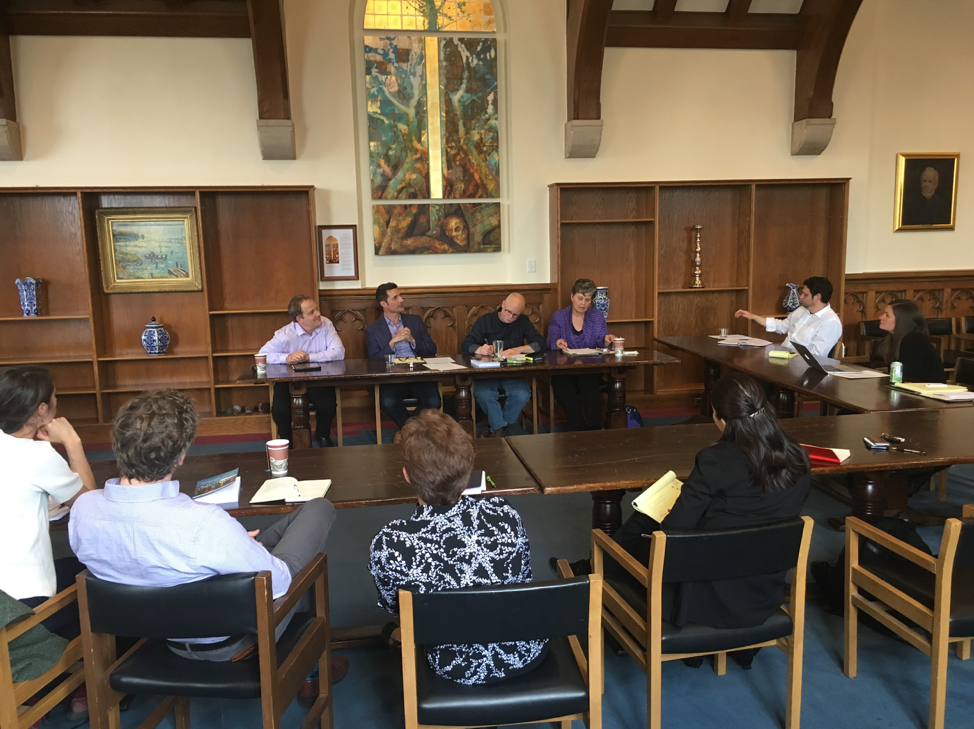
Looking Back, Looking Forward: Reflections on Theology & the Social Sciences
Doctoral students from Duke University organized a panel discussion on March 29, 2019 to consider the history and promise of qualitative approaches to research and writing in theology. Titled “Looking Back, Looking Forward: Reflections on Theology & the Social Sciences,” this panel was moderated by Luke Bretherton (Duke Divinity School) and featured reflections from David Eagle (Duke Global Health Institute), Jan Holton (Duke Divinity School), and Todd Whitmore (University of Notre Dame).
Panelists and participants considered prospects for convergence and exchange between theologians and social scientists. In contrast with the reluctance and occasional hostility of John Milbank, Stanley Hauerwas, and others, panelists spoke optimistically of using qualitative methods to raise theological questions and develop constructive theological proposals, particularly in relationship to the contours of everyday life.
Whitmore and Holton both have drawn extensively on participant observation in their theological and ethical writing, while Eagle studies clergy health using survey tools. Holton suggested the need to expand the dialogue between theology and social sciences, noting how an ethnographic approach to research requires a congruence between lived theology, academic theology, practical theology, and social scientific inquiry. Eagle encouraged theologians to consider the use of qualitative methods in addition to participant observation (such as surveys and interviews) principally for pragmatic reasons, while Whitmore registered a strong moral claim for participant observation as apprenticeship. Discussion explored the challenges of Whitmore’s apprenticeship model for the study of morally repugnant others and whether participant observation might be framed along broader lines, including as a search for practical wisdom or understanding.
The panel was organized by Dustin Benac, Emily Dubie, Mike Grigoni, Sarah Jobe, and Ryan Juskus as a component of their ongoing research and work through the Theology, Religion, and Qualitative Methods Network. Formed in 2018 with a grant from Duke Interdisciplinary Studies, this group of doctoral students gathers monthly to consider the use of qualitative methods in the study of theology and religion. Among others, the following texts have served as a basis for ongoing conversation:
- Jon Bialecki, “Anthropology and Theology in Parallax,” (Anthropology of This Century, 2018)
- Frédéric Vandenberghe, “Sociology as Practical Philosophy and Moral Science,” Theory, Culture & Society 35, 3 (2017): 77-97
- Pierre Bourdieu, “Understanding,” in The Weight of the World: Social Suffering in Contemporary Society (Stanford University Press, 2000)
- Bent Flyvbjerg, Making Social Science Matter: Why Social Inquiry Fails and How it Can Succeed Again, trans. Steven Sampson (Cambridge University Press, 2001)
- J. Derrick Lemons, ed. Theologically Engaged Anthropology (Oxford University Press, November 2018)
- Eloise Menses and David Bronkema, eds. On Knowing Humanity: Insights from Theology for Anthropology (Routledge, 2017)
- Christopher James. Church Planting in Post-Christian Soil: Theology and Practice (Oxford University Press, 2018)
- Jon Bialecki, A Diagram for Fire: Miracles and Variation in an American Charismatic Movement (University of California Press, 2017)
- Todd Whitmore, Imitating Christ in Magwi (T&T Clark, 2019)